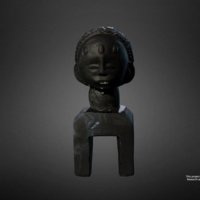Heddle pulley with carved head
Dublin Core
Title
Heddle pulley with carved head
Subject
CULTURAL HERITAGE
Description
It was common for men to do weaving in West African countries. By means of heddle pulleys the weavers separate the warp threads into ‘fans’ by means of foot pedals. Then the weft threads are ‘shot through’ these ‘fans’. Thus, fabric is created. These heddle pulleys were often carved, and with this one, a face can be made out on one of the sides. Often the faces were of goddesses, so the weavers could look at beauty while they work. Baule peoples and their neighbors to the West, the Guro, are famous as weavers, and are known for their fine indigo-and-white cotton fabrics. Scholars have suggested that the prominent display of pulleys, hanging over the weaver’s loom in the public place, afforded artists their best opportunity to showcase their carving skills, in the hope to attract commissions for figures and masks. This figurative pulley with carved a head demonstrates the efforts put by Baule and Guro artists into beautifying the simplest functional object. Sources: Smithsonian National Museum of African Art
Type
3D Object
Spatial Coverage
current,13.084317, -59.600278;
License
Creative Commons Attribution-NonCommercial-ShareAlike License
Europeana
Europeana Data Provider
Barbados Museum and Historical Society
Object
https://sketchfab.com/models/5d5d1a61bb3b4b5fb4ba0bb61b40885f/embed
Europeana Type
3D
3D Object Item Type Metadata
Wiki
https://eu-lac.org/vmwiki/index.php/Heddle_pulley_with_carved_head
DescriptionEN
It was common for men to do weaving in West African countries. By means of heddle pulleys the weavers separate the warp threads into ‘fans’ by means of foot pedals. Then the weft threads are ‘shot through’ these ‘fans’. Thus, fabric is created. These heddle pulleys were often carved, and with this one, a face can be made out on one of the sides. Often the faces were of goddesses, so the weavers could look at beauty while they work. Baule peoples and their neighbors to the West, the Guro, are famous as weavers, and are known for their fine indigo-and-white cotton fabrics. Scholars have suggested that the prominent display of pulleys, hanging over the weaver’s loom in the public place, afforded artists their best opportunity to showcase their carving skills, in the hope to attract commissions for figures and masks. This figurative pulley with carved a head demonstrates the efforts put by Baule and Guro artists into beautifying the simplest functional object. Sources: Smithsonian National Museum of African Art
Files
Citation
“Heddle pulley with carved head,” EU-LAC, accessed February 23, 2026, https://eu-lac.org/omeka/items/show/245.
Embed
Copy the code below into your web page


